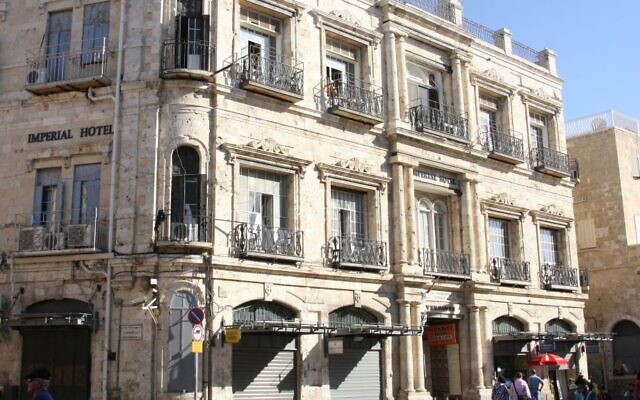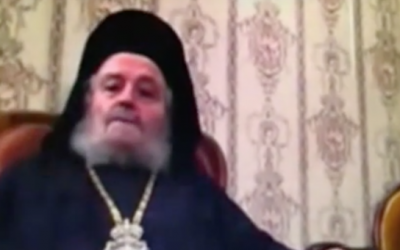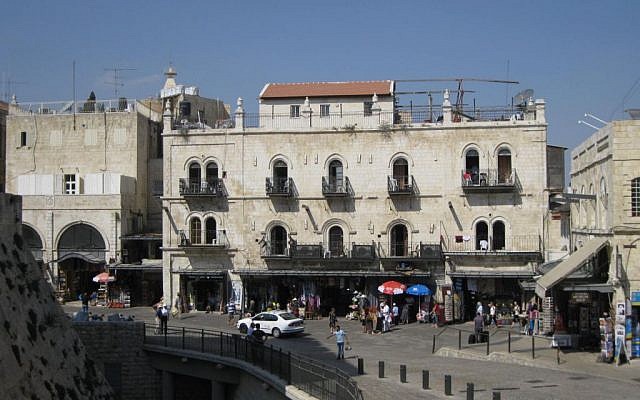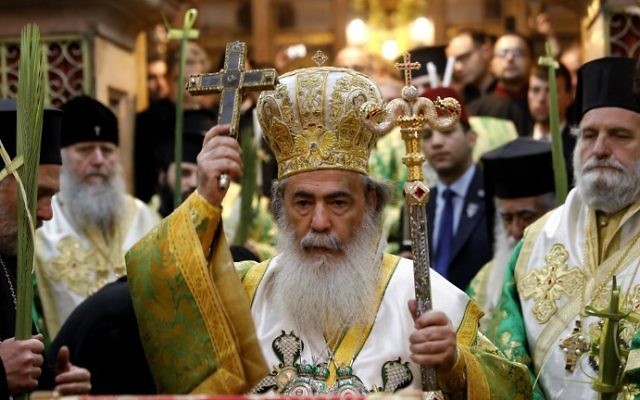
The Imperial Hotel at the Jaffa Gate, the lease to which was sold to the right-wing Ateret Cohanim organization and is the subject of an appeal by the Greek Orthodox Patriarch. (Shmuel Bar-Am)
The Jerusalem District Court on Monday issued a landmark declaration that upholds a set of real estate deals struck between officials from the Greek Orthodox Church and an Israeli right-wing group for two hotels near Jaffa Gate in Jerusalem’s Old City.
Judge Gila Kanfi-Steinitz, deputy head of the district court, ruled the Greek Orthodox Patriarchate was unable to establish that the deals, made in 2004 between the church and three overseas holding companies for the Ateret Cohanim organization, were fraudulent or involved bribery and were therefore valid.
The contracts had been signed by those authorized by the patriarchate to do so and the plaintiffs – the investors – had paid the full amount for the leases.
Kanfi-Steinitz ordered the church to pay NIS 30,000 ($8,420) to the Ateret Cohanim group in legal costs.
The decision — a declaratory judgement — provides the investors with a conclusive ruling on their rights and obligations.
It will bring more unwelcome attention to the Patriarchate, which is already under fire for a series of real estate sales in West Jerusalem.
The 2004 agreements were to lease buildings, not to sell them, but they are for 99 years, renewable for another 99 years, which essentially puts them into the settlers’ hands for good in one of the most visible positions in the Old City, between the Jaffa Gate and the Old City market.
The decision is also likely to aggravate a rift between the patriarchate, whose senior positions are held by Greek nationals, and those local Palestinian Orthodox Christians who want Arabs in senior posts.
A 2005 expose by the Maariv newspaper of the deals to lease the two hotels, and an additional building, caused uproar among Palestinians both within and outside of the church, and led to the sacking of then-patriarch Irenaios.
Irenaios claimed that the deals had been reached and signed by his finance director, Nikolas Papadimos, without his approval and that Papadimos had misused a power of attorney issued to him to allow him to handle other affairs of the church.

Former Greek Orthodox Patriarch Irenaois (YouTube screenshot)
The agreements were so explosive because behind them stood Ateret Cohanim, which works to acquire property to establish a Jewish majority in the Old City and in Arab neighborhoods of East Jerusalem.
The Palestinians hope that East Jerusalem will one day be the capital of their future state.
The case was brought by Berisford Investments Ltd, Richards Marketing Corporation and Gallow Global Ltd, against the former patriarch Irenaios, the current one, Theophilus, and the Greek Orthodox Patriarchate of Jerusalem itself.
“After examining the witnesses from both sides and considering their claims, I reached the conclusion that the defendants did not bring a sufficient evidentiary base…for their claims of bribery or fraud being the foundation of the deals,” the judge ruled.
She therefore decided to accept the arguments of the plaintiffs and to rule that the three deals were valid.
The first lease was signed in August 2004 between the patriarchate and Richards Marketing Corporation for the transfer of the New Imperial Hotel at a cost of $1.25 million.

Petra Hotel in Jerusalem (DiggerDina Wikipedia)
The second, also signed in August 2004, was reached with Berisford Investments Ltd for the lease on the Petra Hotel, at a cost of $500,000.
A third deal was signed in October 2004 by Gallow Global Ltd to lease an Old City property and grounds in Muazmia Street 18 for $55,000.
The district court ruling said there was no disagreement that the leases were signed between the parties and that Ateret Cohanim was the organization which identified the buildings, found the investors, and carried out the negotiations via its chairman Mati Dan and a lawyer, Eitan Geva.
The negotiations were also attended by Barak Weinberg from the Midreshet Kedma NGO – a sister organization of Ateret Cohanim.
The three agreements were signed by Etan Geva for the investors and by Nikolas Papadimus, then the patriarch’s finance director, who had power of attorney to sign for his boss.
Noting that the case was purely a legal one, despite the different “agendas” of both sides, Kanfi-Steinitz said that the church’s case arguing that the contracts were not valid was based almost entirely on allegations of bribery.
The church claimed that Mati Dan and Papadimus reached a verbal agreement under which Papadimus was offered $1 million for sealing the deals. It also claimed that both Papadimus and Irenaios were corrupt, and said the circumstances surrounding the deal, such as the price of the leases, and the timing of the power of attorney, were strange.
In his evidence, the Patriarchate’s General Secretary Archbishop Aristarchus said Papadimos started to work at the patriarchate in 2002, at the age of 29, gradually establishing close ties with Patriarch Irenaios and becoming a powerhouse in the church when he took over as director of finance.
His clout caused unease within the church and rumors started spreading when he bought an expensive Mercedes car, even though his salary was just $1,000 a month.
Shortly after the deals were made, in November 2004, Papadimos suddenly left Israel with no advance notice. That was, the church claimed, after Irenaios had accused Papadimos of being behind an attempt to harm him by causing a car crash and after he had summoned a lawyer from Greece to look into possible mismanagement by Papadimos.
Furthermore, said the patriarchate’s lawyers, Papadimos’s wife had allegedly been detained trying to enter Greece with 120,000 Euros in cash and a large amount of jewelry.
The defendants also claimed that during the three months before Papadimos left the country, he withdrew NIS 3.4 million from the patriarchate’s accounts – around NIS 1 million more than the patriarchate’s monthly expenses – and pocketed it.
They also charged that he had re-entered Israel in 2009 with forged documents after a criminal conviction during a stay in Panama, and had used three patriarchate checks he still had in his possession, and left for Greece, again on forged papers in 2013, where he was convicted of forgery and sentenced to prison.
The church brought media reports to substantiate allegations that they discovered — only after Papadimos had left Israel in 2004 — that already in September 2003, Irenaios had – in the name of the Patriarchate – connected with a company owned by Papadimos, that he had allowed Papadimos to live rent-free in an apartment owned by the patriarchate in Jaffa’s Andromeda project, and that Papadimos had bought jewelry worth around NIS 200,000 on Tel Aviv’s exclusive Kikar Hamedina shopping district with patriarchate checks which subsequently bounced because of problems with his signature.
The church also alleged that Irenaios backed the deals because he thought that Ateret Cohanim would secure the Israeli government’s recognition of him as patriarch – recognition that came in January 2004, two and a half years after he was enthroned.
Finally, the church charged that after the deals were exposed, Ateret Cohanim provided Irenaios with a defense lawyer.
The plaintiffs, by contrast, told the court that Papadimos had told them he would leave Israel to avoid being blamed for the deals by opponents of Irenaios, that he had withdrawn money from church accounts to pay church expenses, most of which are paid in cash, and that while the church had issued a complaint to the Greek police, they had not sought to have him prosecuted because they lacked the evidence, with the result that he — Papadimos — was released from Greek jail after being cleared of all accusations against him.
Judge Kanfi-Steinitz said she found no evidence to prove that Irenaios was personally corrupt in general, or that personal corruption had driven him to agree to contact with the parties interested in leasing the properties.
Many of the church’s claims against Papadimos were based on hearsay or media reports and even then, related to events which took place long after the agreements were signed, the judge went on.
Papadimos was indeed freed from Greek jail and cleared of all accusations against him, and it was not clear why the current patriarch, Theophilus, had not provided evidence to make the accusations stick, she wrote.
The plaintiff’s lawyers denied that any illegitimate money had been promised to Papadimos or Irenaios and that the offer to condition Israel’s recognition of Irenaios on the agreements was untrue.
They also claimed that Irenaios wanted Israeli control of the Old City to be maintained at a time when there was much talk about dividing sovereignty there between Israel and Jordan. He wanted to maintain the Greek hegemony over the church and prevent its takeover by Palestinians, they said.
Finally, the plaintiffs claimed that Irenaios wanted the deal because the church was mired in debt.

Greek Orthodox Patriarch of Jerusalem Theophilos III (C) leads the Palm Sunday Easter procession at the Church of the Holy Sepulchre in Jerusalem’s Old City on April 9, 2017. (AFP Photo/Gali Tibbon)
Irenaios was cleared by the Palestinian Authority of the accusations against him, but the Holy Synod of Jerusalem of the Brotherhood of the Holy Sepulchre not only voted to dismiss him, but demoted him to the rank of monk.
Theophilus lll, the current patriarch, was elected in August 2005.
Content retrieved from: https://www.timesofisrael.com/court-sides-with-right-wing-jewish-group-in-old-city-church-property-dispute/.
